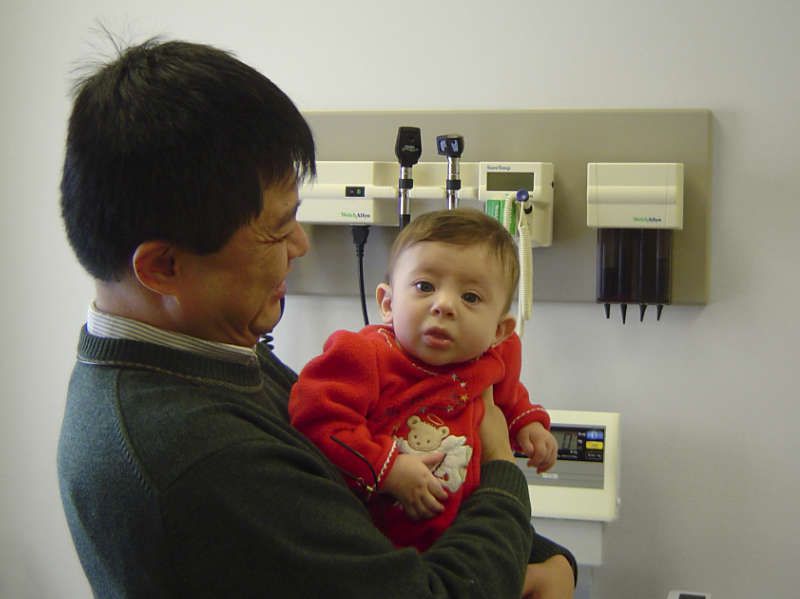Diagnostic Services
 Children with special needs caused by rare genetic disorders often have complex medical conditions which are difficult to diagnose and treat. Many times, their families have to cope with a long, drawn out diagnostic journey to find out what’s wrong with their child. Not only is the delay in diagnosis and treatment detrimental to the child, but the family and child frequently experience hospitalizations which can be stressful, frustrating and expensive.
Children with special needs caused by rare genetic disorders often have complex medical conditions which are difficult to diagnose and treat. Many times, their families have to cope with a long, drawn out diagnostic journey to find out what’s wrong with their child. Not only is the delay in diagnosis and treatment detrimental to the child, but the family and child frequently experience hospitalizations which can be stressful, frustrating and expensive.
Early diagnostic testing for rare genetic disorders is essential to effective care and treatment for these children. An accurate diagnostic test can be life-saving and often dramatically changes a child’s disease outcome, reducing or eliminating debilitating physical and mental effects of his or her disease.
Many children with genetic disorders, however, have not been accurately diagnosed. In some cases, these children have even been misdiagnosed. Although children with genetic diseases can have characteristic appearances which may help physicians make a diagnosis, laboratory testing is needed to confirm a diagnosis for most genetic disorders.
DDC Clinic Molecular Diagnostics Laboratory
Our clinic is fortunate to have an onsite molecular diagnostics laboratory which performs specialized testing for more than 800 rare genetic disorders. Conducting in-house testing has enabled us to provide compassionate, personalized service to our patient families and has substantially improved our patient diagnosis rate in a timely manner.
Through affordable and accurate genetic testing, we’ve given answers to families who have been impacted for generations by undiagnosed conditions, enhanced the quality of life for many special needs children and saved numerous lives.
In addition to serving our patient families, our CLIA certified lab also provides high quality diagnostic genetic testing services to clinicians across the country and around the globe.
Genetic Awareness Panel (GAP)
 Developed by our molecular diagnostics laboratory, our Genetic Awareness Panel (GAP) is a groundbreaking diagnostic tool that can simultaneously test for 270 rare conditions found in the Amish population.
Developed by our molecular diagnostics laboratory, our Genetic Awareness Panel (GAP) is a groundbreaking diagnostic tool that can simultaneously test for 270 rare conditions found in the Amish population.
All too often, investigating genetic disorders in Amish patients begins when a patient’s disorder has already progressed significantly. GAP aids in early diagnosis and intervention, helping to prevent the progression of devastating genetic diseases and life-threatening health complications.
Since its start, our Genetic Awareness Panel has proven to be an important tool, both for diagnosis and identification of risk factors. GAP has provided long-awaited answers to many of our patients as well as to families throughout the Midwest affected by a variety of conditions including GM3 Synthase Deficiency, Byler Disease and Troyer Syndrome.
Through GAP, we can determine if a child is at increased risk for developing a blood clot, heart condition or other issue as an adult, information that is critically important to parents, providing them with knowledge of health risks that their child may experience in the future.
When used for genetic testing in Amish adults, GAP provides important information on an individual’s predisposition to genetic disorders and identifies if they’re a carrier for diseases which could get passed on to their children.
Newborn Screening
Standard newborn screening panels in most states don’t test for many diseases commonly found in the Amish community which can affect the health and development of an infant. As early diagnosis and intervention are crucial to preventing long-term health issues, our clinic is involved in newborn screening programs to identify and diagnose infants with rare disorders as soon as possible.
Through our partnership with Middlefield Care Center, we provide GAP testing to Amish parents as a supplement to standard newborn screenings. Using a sample of a newborn’s cord blood, our clinic’s lab can determine if an infant is affected by any of 160 rare conditions. With GAP, early detection leads to earlier treatments and better outcomes for affected babies.
GAP Services for Physicians
Many physicians across the country have little to no experience with disorders that affect the Amish population and no access to the tests needed to detect them. To meet their needs, we make our GAP testing available to other physicians, giving them access to effective targeted testing and reducing the needless suffering and long hospital stays that Amish families often endure while waiting for answers.
Your Donation Makes a Big Difference
Just $75 can help pay for a targeted genetic test, providing a family with a life-changing diagnosis.
Donate now
